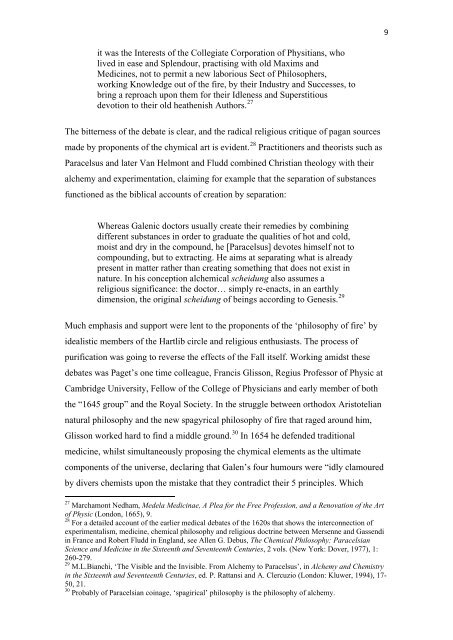Medical Science and the Anatomia Animata in Milton's Paradise Lost
Medical Science and the Anatomia Animata in Milton's Paradise Lost
Medical Science and the Anatomia Animata in Milton's Paradise Lost
Create successful ePaper yourself
Turn your PDF publications into a flip-book with our unique Google optimized e-Paper software.
it was <strong>the</strong> Interests of <strong>the</strong> Collegiate Corporation of Physitians, who<br />
lived <strong>in</strong> ease <strong>and</strong> Splendour, practis<strong>in</strong>g with old Maxims <strong>and</strong><br />
Medic<strong>in</strong>es, not to permit a new laborious Sect of Philosophers,<br />
work<strong>in</strong>g Knowledge out of <strong>the</strong> fire, by <strong>the</strong>ir Industry <strong>and</strong> Successes, to<br />
br<strong>in</strong>g a reproach upon <strong>the</strong>m for <strong>the</strong>ir Idleness <strong>and</strong> Superstitious<br />
devotion to <strong>the</strong>ir old hea<strong>the</strong>nish Authors. 27<br />
The bitterness of <strong>the</strong> debate is clear, <strong>and</strong> <strong>the</strong> radical religious critique of pagan sources<br />
made by proponents of <strong>the</strong> chymical art is evident. 28<br />
Practitioners <strong>and</strong> <strong>the</strong>orists such as<br />
Paracelsus <strong>and</strong> later Van Helmont <strong>and</strong> Fludd comb<strong>in</strong>ed Christian <strong>the</strong>ology with <strong>the</strong>ir<br />
alchemy <strong>and</strong> experimentation, claim<strong>in</strong>g for example that <strong>the</strong> separation of substances<br />
functioned as <strong>the</strong> biblical accounts of creation by separation:<br />
Whereas Galenic doctors usually create <strong>the</strong>ir remedies by comb<strong>in</strong><strong>in</strong>g<br />
different substances <strong>in</strong> order to graduate <strong>the</strong> qualities of hot <strong>and</strong> cold,<br />
moist <strong>and</strong> dry <strong>in</strong> <strong>the</strong> compound, he [Paracelsus] devotes himself not to<br />
compound<strong>in</strong>g, but to extract<strong>in</strong>g. He aims at separat<strong>in</strong>g what is already<br />
present <strong>in</strong> matter ra<strong>the</strong>r than creat<strong>in</strong>g someth<strong>in</strong>g that does not exist <strong>in</strong><br />
nature. In his conception alchemical scheidung also assumes a<br />
religious significance: <strong>the</strong> doctor… simply re-enacts, <strong>in</strong> an earthly<br />
dimension, <strong>the</strong> orig<strong>in</strong>al scheidung of be<strong>in</strong>gs accord<strong>in</strong>g to Genesis. 29<br />
Much emphasis <strong>and</strong> support were lent to <strong>the</strong> proponents of <strong>the</strong> ‘philosophy of fire’ by<br />
idealistic members of <strong>the</strong> Hartlib circle <strong>and</strong> religious enthusiasts. The process of<br />
purification was go<strong>in</strong>g to reverse <strong>the</strong> effects of <strong>the</strong> Fall itself. Work<strong>in</strong>g amidst <strong>the</strong>se<br />
debates was Paget’s one time colleague, Francis Glisson, Regius Professor of Physic at<br />
Cambridge University, Fellow of <strong>the</strong> College of Physicians <strong>and</strong> early member of both<br />
<strong>the</strong> “1645 group” <strong>and</strong> <strong>the</strong> Royal Society. In <strong>the</strong> struggle between orthodox Aristotelian<br />
natural philosophy <strong>and</strong> <strong>the</strong> new spagyrical philosophy of fire that raged around him,<br />
Glisson worked hard to f<strong>in</strong>d a middle ground. 30<br />
In 1654 he defended traditional<br />
medic<strong>in</strong>e, whilst simultaneously propos<strong>in</strong>g <strong>the</strong> chymical elements as <strong>the</strong> ultimate<br />
components of <strong>the</strong> universe, declar<strong>in</strong>g that Galen’s four humours were “idly clamoured<br />
by divers chemists upon <strong>the</strong> mistake that <strong>the</strong>y contradict <strong>the</strong>ir 5 pr<strong>in</strong>ciples. Which<br />
27<br />
Marchamont Nedham, Medela Medic<strong>in</strong>ae, A Plea for <strong>the</strong> Free Profession, <strong>and</strong> a Renovation of <strong>the</strong> Art<br />
of Physic (London, 1665), 9.<br />
28<br />
For a detailed account of <strong>the</strong> earlier medical debates of <strong>the</strong> 1620s that shows <strong>the</strong> <strong>in</strong>terconnection of<br />
experimentalism, medic<strong>in</strong>e, chemical philosophy <strong>and</strong> religious doctr<strong>in</strong>e between Mersenne <strong>and</strong> Gassendi<br />
<strong>in</strong> France <strong>and</strong> Robert Fludd <strong>in</strong> Engl<strong>and</strong>, see Allen G. Debus, The Chemical Philosophy: Paracelsian<br />
<strong>Science</strong> <strong>and</strong> Medic<strong>in</strong>e <strong>in</strong> <strong>the</strong> Sixteenth <strong>and</strong> Seventeenth Centuries, 2 vols. (New York: Dover, 1977), 1:<br />
260-279.<br />
29<br />
M.L.Bianchi, ‘The Visible <strong>and</strong> <strong>the</strong> Invisible. From Alchemy to Paracelsus’, <strong>in</strong> Alchemy <strong>and</strong> Chemistry<br />
<strong>in</strong> <strong>the</strong> Sixteenth <strong>and</strong> Seventeenth Centuries, ed. P. Rattansi <strong>and</strong> A. Clercuzio (London: Kluwer, 1994), 17-<br />
50, 21.<br />
30<br />
Probably of Paracelsian co<strong>in</strong>age, ‘spagirical’ philosophy is <strong>the</strong> philosophy of alchemy.<br />
9
















